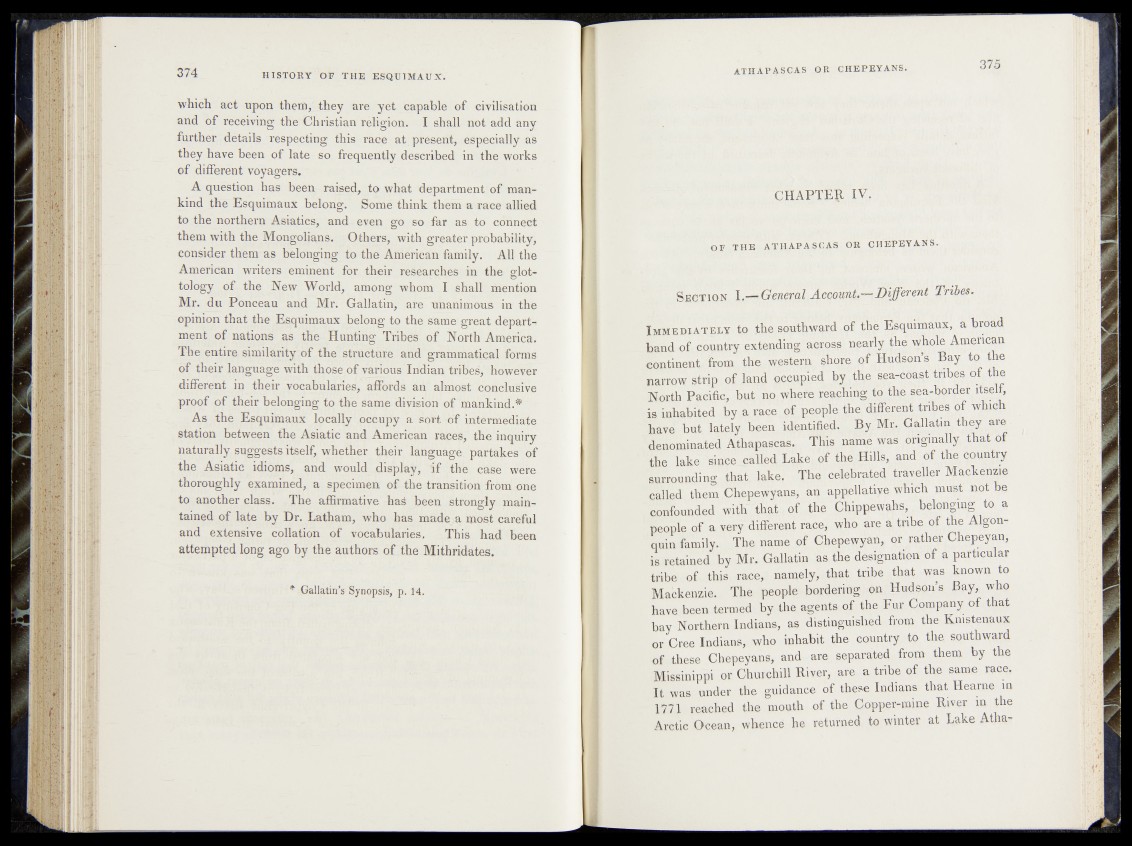
which act upon them, they are yet capable of civilisation
and of receiving the Christian religion. I shall not add any
further details respecting this race at present, especially as
they have been of late so. frequently described in the works
of different voyagers.
A question has been raised, to what department of mankind
the Esquimaux belong. Some think them a race allied
to the northern Asiatics, and even go so far as to connect
them with the Mongolians. Others, with greater probability,
consider them as belonging to the American family. All the
American writers eminent for their researches in the glot-
tology of the New World, among whom I shall mention
Mr. du Ponceau and Mr. Gallatin, are unanimous in the
opinion that the Esquimaux belong to the same great departs
ment of nations as the Hunting Tribes of North America.
The entire similarity of the structure and grammatical forms
of their language with those of various Indian tribes“, however
different in their vocabularies, affords an almost conclusive
proof of their belonging to the same division of mankind.*
As the Esquimaux locally occupy a sort of intermediate
station between the Asiatic and American races, the inquiry
naturally suggests itself, whether their language, partakes of
the Asiatic idioms, and would display, if the case were
thoroughly examined, a specimen of the transition from one
to another class. The affirmative haS been strongly maintained
of late by Dr. Latham, who has madera most careful
and extensive collation of vocabularies. This had been
attempted long ago by the authors of the Mithridates.
Gallatin's Synopsis, p. 14.
CHAPTER IV.
OF THE ATHAPASCAS OR CHEfEYANS.
Section I.— General,4cconn{,^-Different Tribes.
Immediately to .the southward of tlm fesquima,ux, a broad
band of country-extending across nearly tbe .whole American
continent ^rom the western 0idre of Hudson’s Bay to the
narrow strip of land occupied by ( | | r a 3 8 B | t ||M ° f.p g
North Pacific, but no where reaching
is inhabited by a race.of people*fe^fferent tn^es of winch
have but lately, been, identified^By, Gallatin t h | | are
denominated Athapascas. This name was. originally that of
the lake since .called Lake, pf the, Hills, and of the qountry
surrounding that lake, The>^1ebra!^ Mackenzie
called them Chepewyans; an, apppllatiye which must not be
confounded with“ that of the Chippewahs,, belonging to a
people of a very different race, who are a tribe of the Algonquin
family. The name of Chepewyan, or rather Chepeyan,
is retained by Mr. Gallatin as the designation of a particular
tribe of this race, namely, that tribe -that was known to
Mackenzie. The people bordering .on Hudson’s, .Bay, who
have been termed by the agents* qf the Fur. Company of that
bay Northern Indians, as distinguished from the Knistenau*
or Cree Indians, who inhabit the country to, thq southward
of these Chepeyans, and are separated from- them by the
Missinippi or Churchill River, are a tribe of the same race,
It was under the guidance of these Indians that Hearne m
1771 reached the mouth of the Copper-mine River m the
Arctic Ocean, whence he returned to winter at Lake Atha